AI Literacies
Digital literacy in the 21st century means understanding not just how to use technology, but how technology shapes us. (Gilster, 1997) The understanding of GenAI tools is situated within the broader scope of digital literacy, asking students and educators to move beyond surface-level tool proficiency to develop deeper comprehension of artificial intelligence's role in society, education, and human decision-making.
The SATLE funded open Digital Literacy and Technological Transformations course (University College Dublin, 2025) aims to equip learners with key digital literacy skills that are essential to study and work in rapidly evolving online environments. Building on Belshaw's (2011) foundational work identifying eight essential elements of digital literacy (cultural, cognitive, constructive, confident, communicative, creative, critical, and civic), Opened Culture (2025) has developed what they term "Dimensions of AI Literacies," a framework that extends existing digital literacy scholarship into the realm of artificial intelligence.
Fluency with GenAI requires grappling with complex interconnections between technology and pedagogy, what Tim Fawns (2022) calls entanglements. One must understand how algorithmic systems can perpetuate existing inequalities, who controls these technologies, and how design choices embed particular values and worldviews. This includes examining questions of environmental sustainability, labor displacement, and the concentration of AI capabilities within a handful of global corporations.
Developing sensitivity to the subtle ways AI systems influence human behavior and cognition is crucially important. From recommendation algorithms that shape our information consumption to emotion recognition technologies that claim to read our inner states, AI increasingly mediates our relationship with knowledge, creativity, and even our understanding of ourselves, in hidden ways.

Image Credit: Ethically engaging by Visual Thinkery
AI fluency demands practical skills in evaluation and verification. We must learn to navigate copyright complexities, privacy implications, and the often-invisible data collection that powers these systems. This Infographic on AI Ethics, sourced from the UCD AI Futures SATLE project, is a useful visual overview of some of the key ethical concerns related to generative AI. The creator, Leon Furze, studies the implications of AI on writing instruction and education. His blog series on AI ethics is an excellent resource for both students and staff. The blog post has been updated since publication and Furze has expanded upon the nine points covered here, and linked below:
- Bias and discrimination
- Environmental concerns
- Truth and academic integrity
- Copyright
- Privacy
- Datafication
- Emotion recognition
- Human labour
- Power
The academic community has created several supports for assessing when AI-generated content is appropriate, reliable, or ethically sourced:
- ALT’s Framework for Ethical Learning Technology provides structured guidance for educational institutions to evaluate and implement learning technologies while considering ethical implications and potential impacts on students and educators.
- A Framework for the Learning and Teaching of Critical AI Literacy skills (Open University, 2025) outlines a framework for teaching Critical AI Literacy skills, emphasizing the need for educators and students to critically engage with AI technologies and their societal implications.
- This comprehensive Generative AI toolkit (2024) from University College Cork has been specifically designed to assist staff in considering the responsible integration of GenAI into their learning and teaching practices.
- The Civics of Technology Project develops research, curriculum, and professional development to encourage teachers and students to critically inquire into the effects of technology on individual and collective lives, working to advance democratic, ethical, and just uses of technology in schools and society.
- Charles Logan, a PhD candidate in learning sciences at Northwestern University, curates this open library of work related to AI and its impacts on the environment called Against AI and Its Environmental Harms.
Ultimately, fluency is about cultivating critical citizenship in a world where artificial intelligence is not neutral but deeply political, requiring informed participation from all members of the university community in shaping its development and deployment.
References
- Association for Learning Technology. (n.d.). ALT's framework for ethical learning technology.
- Belshaw, D. (2011). What is digital literacy? A pragmatic investigation [Doctoral dissertation, Durham University].
- Civics of Technology Project. (n.d.). Home.
- Fawns, T. (2022). An entangled pedagogy: Looking beyond the pedagogy—technology dichotomy. Postdigital Science and Education, 4(3), 711–728.
- Furze, L. (2023, January 26). Teaching AI ethics [Blog post series]. Leon Furze.
- Furze, L. (n.d.). AI ethics.
- Gilster, P. (1997). Digital literacy. John Wiley & Sons.
- Logan, C. (n.d.). Against AI and its environmental harms [Open library].
- Open University. (2025). A framework for the learning and teaching of critical AI literacy skills.
- Opened Culture. (2025). Dimensions of AI literacies.
- University College Cork. (2024). Generative AI toolkit.
- University College Dublin. (2025). Digital literacy and technological transformations.